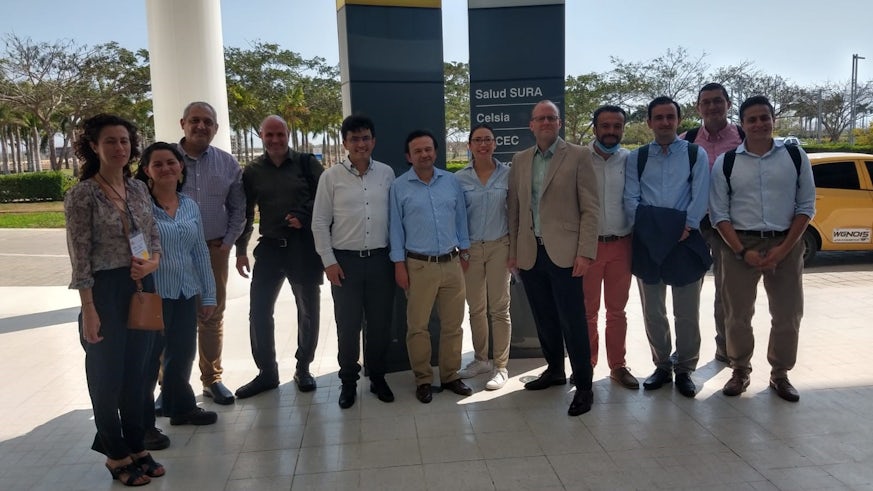Driving the transition towards low- and zero-emission road freight transportation in Colombia
19 April 2022

Academics at the Business school have recently returned from a visit to Colombia as part of the GIRO ZERO project.
Established in 2021, the GIRO ZERO project is a partnership between Cardiff University and Universidad de Los Andes to steer the Colombian road freight sector towards a zero emissions strategy.
Professor Vasco Sanchez Rodrigues, Professor Emrah Demir and Dr Wessam Abouarghoub spent just under two weeks in Colombia, meeting GIRO ZERO project beneficiaries and research partners, and presenting at events in Cartagena and Bogota.
During the visit, they met with key beneficiaries and were able to share and discuss the project’s initial outputs as it nears the end of its first year. Organised by project-partner Universidad de Los Andes, they met with Colfecar, the Colombian Confederation of Logistics & Transport Companies, ANDI, the National Association of Entrepreneurs that represent cargo owners across the country, the National Department for Transport in Colombia, the Ministry of Transport and Infrastructure, and the Association of small truck owners and drivers.
The visit was successful in allowing Business school visitors to capture first-hand feedback from the beneficiaries and plan the project’s priorities going into its second year.
Our visit to Colombia exceeded the beneficiaries’ expectations. Senior representative from ANDI, The National Department for Transport, Colfecar, the Ministry of Transport and Infrastructure, and the Association of small truck owners and drivers were extremely happy with what we have produced in the project so far, which includes a toolbox that can help the Colombian road freight transport sector estimate their current emissions and can guide them on their journey to zero emissions.
“The project has incredible potential to generate further impact, and one demonstration of that is that the Ministry of Transport and Infrastructure has committed to adopt a dashboard we have developed as their own.”
The project has developed a toolbox of dashboards as one of its main outputs. Dr Wessam Abouarghoub, Reader in Logistics and Operations Management and principal expert of Giro Zero, who is leading that element of Giro Zero with his business data analytics established expertise, said the toolbox Giro Zero has developed “serves many purposes, such as the ability to visualise more than 30 million truck trips across Colombia to better understand the drivers of road freight emissions for different types of trucks, cargo types and loads and fuel types.
Another dashboard has been set up as a tool for stakeholders to simulate different operational and technology scenarios, analyse the impact of various strategic and operational decisions on their emissions and help them set emissions policies and targets.
In addition to meeting with beneficiaries, Business school staff also gave a series of presentations in Cartagena, including tutorials on the low emissions simulation tool and a seminar to present the result of the first year of the project.
Our Colombia visit has been successful, memorable, and impactful. At the end of first year, we have already started creating an impact for Colombia. The developed simulation tool has become an inspiration for the Colombian road freight industry, and we aim to publish high-quality papers that represent the knowledge gained from this visit.
Prof Gordon Wilmsmeier of Universidad de Los Andes, the Giro Zero leader, said: “It was very important that Cardiff University, as a partner, visited to get real experience of Colombia, the environment and to engage the sector, and also so that we could together experience the feedback and reactions to the work we’ve been doing.
“To that respect our collaboration has been very successful because we have delivered several tangible results as can be seen in the dashboard, the simulator and other reports. To present them together to the stakeholder contributes towards further developing the network.”
Dr Juan Pablo Bocarejo, Associate Professor at Universidad de Los Andes, said: “Our partnership with Cardiff University has contributed to create useful technical tools to build a Road to Zero Emissions in freight transport in Colombia. Our colleagues at the Business school have provided key insights and experience from the UK to develop our GIRO ZERO project.”



